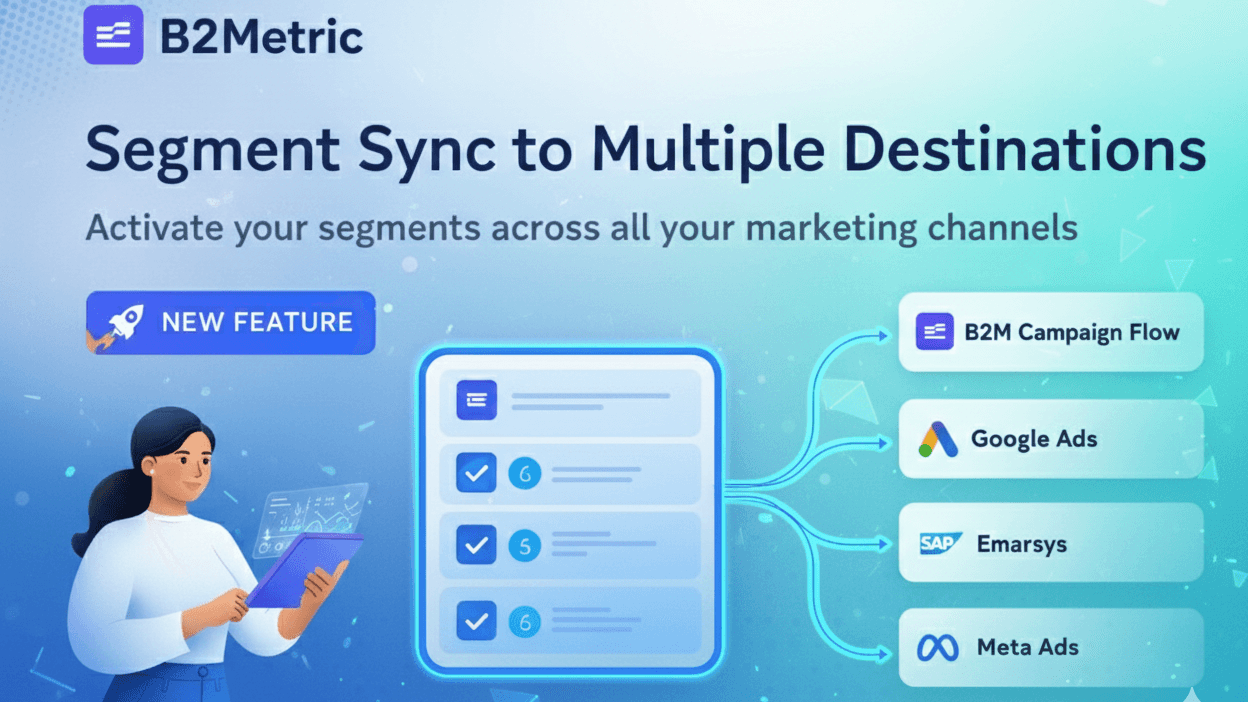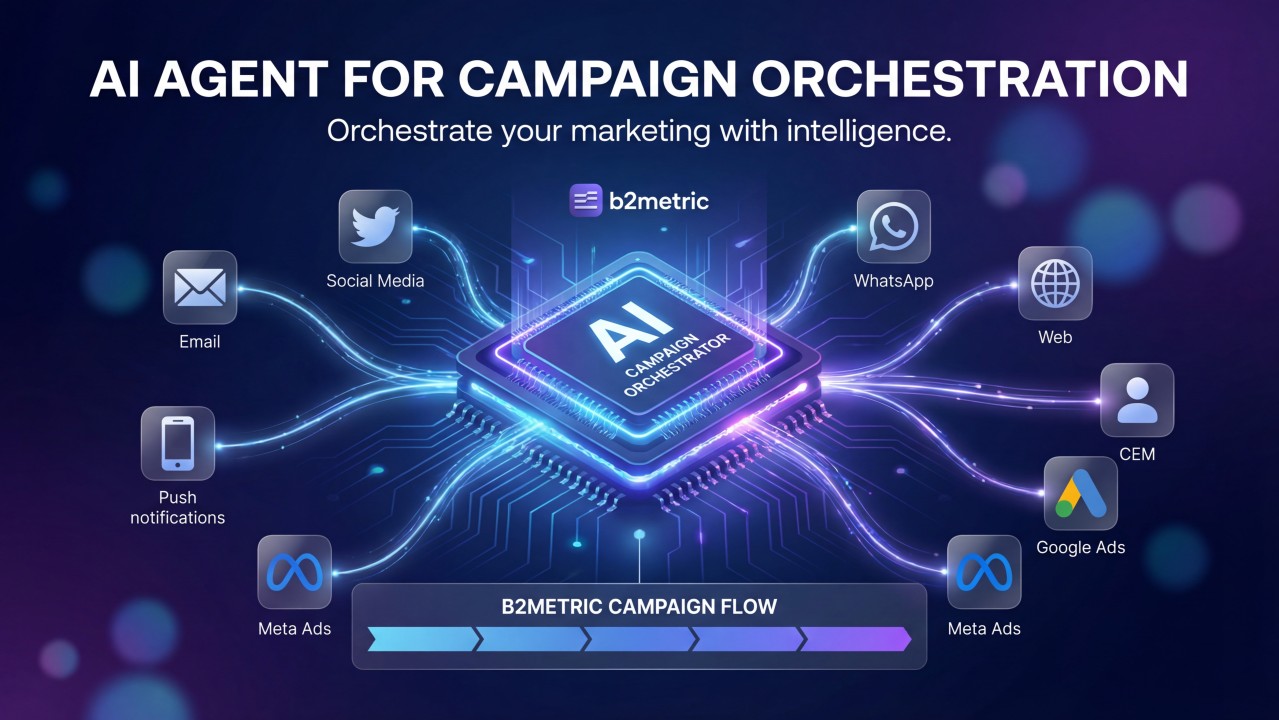Marketing and Analytics

Can Dinlenç
•
•
•
June 26, 2025
Jun 26, 2025
Jun 26, 2025
Jun 26, 2025




Remember when marketing dashboards were your north star? Click-through rates, campaign performance, and customer acquisition costs all lined up neatly in front of you, waiting for your next move.
But let’s be honest, how often did you act on them immediately? How many times did you miss the perfect moment to respond to a customer churn signal, or optimize a campaign before it drained your budget?
It’s not that dashboards are broken.
It’s that the world around them changed.
We’re now in a reality where reacting late isn’t good enough.
Real-time personalization, predictive decision-making, and cross-channel optimization are the new minimum. And here’s the kicker: you won’t meet those standards with static dashboards anymore.
Why Static Dashboards Fall Short?
Let’s break it down.
Traditional dashboards do one thing well: they show you what happened. But what about what’s happening right now? Or better yet, what’s about to happen?
Here’s what marketers are realizing:
Manual analysis takes too long.
Insights don’t equal actions.
You can’t personalize at scale by clicking filters.
This is where AI-powered decision agents step in, not as a replacement for you, but as an extension of your team.
A thinking, adapting, constantly-learning engine that doesn’t just report what’s going on, it acts on it.
From Insights to Instant Action: Meet Your New Growth Partner
Imagine a system that doesn’t just tell you that high-value customers are slipping away, it launches a retention campaign before they churn.
Or a platform that analyzes thousands of micro-behaviors and triggers personalized product recommendations in real time, without you lifting a finger.
This isn’t science fiction.
This is already happening with AI-native customer journey platforms built around:
Predictive analytics for churn and conversion
Customer lifetime value modeling (CLTV)
Next-best-action engines across channels
Plug-and-play marketing optimization
These aren’t generic algorithms. They’re vertical-specific, trained on millions of customer journeys, built to answer your growth questions before you even ask them.
AI Agents vs Traditional Tools: What’s the Real Difference?
Most traditional tools are passive, they wait for you to interpret the data and make a move. AI agents, on the other hand, are active participants.
They learn from every interaction, predict what’s coming next, and execute decisions in real time.
Feature | Traditional Dashboards | AI Agents |
|---|---|---|
Data View | Past-oriented | Predictive & real-time |
Actionability | Manual | Automated |
Personalization | Segmented | Individualized |
Scalability | Limited | Autonomous |
Responsiveness | Delayed | Instant |
It’s not just about seeing the insights, it’s about letting your system act on them while you focus on strategy and creativity.
What to Look For in an AI-Driven Marketing Platform
Not all tools with “AI” labels are built the same. If you’re evaluating platforms, prioritize these:
Vertical-specific intelligence (finance, e-commerce, telecom, etc.)
AutoML capabilities so your data scientists aren’t bottlenecks
Seamless CDP integration with your first-party data
Cross-channel orchestration (email, push, ads, SMS, etc.)
Transparent analytics that let you learn, not just trust blindly
And most importantly, look for platforms that go beyond dashboards and offer decisioning capabilities at the core.
You don’t need to rip and replace.
You need to rethink what your team spends time on, and what agents can do better.
Start by identifying one area: churn, campaign optimization, or cross-channel personalization. Let your first agent prove its worth. Once you see the results, you won’t look back.
Remember when marketing dashboards were your north star? Click-through rates, campaign performance, and customer acquisition costs all lined up neatly in front of you, waiting for your next move.
But let’s be honest, how often did you act on them immediately? How many times did you miss the perfect moment to respond to a customer churn signal, or optimize a campaign before it drained your budget?
It’s not that dashboards are broken.
It’s that the world around them changed.
We’re now in a reality where reacting late isn’t good enough.
Real-time personalization, predictive decision-making, and cross-channel optimization are the new minimum. And here’s the kicker: you won’t meet those standards with static dashboards anymore.
Why Static Dashboards Fall Short?
Let’s break it down.
Traditional dashboards do one thing well: they show you what happened. But what about what’s happening right now? Or better yet, what’s about to happen?
Here’s what marketers are realizing:
Manual analysis takes too long.
Insights don’t equal actions.
You can’t personalize at scale by clicking filters.
This is where AI-powered decision agents step in, not as a replacement for you, but as an extension of your team.
A thinking, adapting, constantly-learning engine that doesn’t just report what’s going on, it acts on it.
From Insights to Instant Action: Meet Your New Growth Partner
Imagine a system that doesn’t just tell you that high-value customers are slipping away, it launches a retention campaign before they churn.
Or a platform that analyzes thousands of micro-behaviors and triggers personalized product recommendations in real time, without you lifting a finger.
This isn’t science fiction.
This is already happening with AI-native customer journey platforms built around:
Predictive analytics for churn and conversion
Customer lifetime value modeling (CLTV)
Next-best-action engines across channels
Plug-and-play marketing optimization
These aren’t generic algorithms. They’re vertical-specific, trained on millions of customer journeys, built to answer your growth questions before you even ask them.
AI Agents vs Traditional Tools: What’s the Real Difference?
Most traditional tools are passive, they wait for you to interpret the data and make a move. AI agents, on the other hand, are active participants.
They learn from every interaction, predict what’s coming next, and execute decisions in real time.
Feature | Traditional Dashboards | AI Agents |
|---|---|---|
Data View | Past-oriented | Predictive & real-time |
Actionability | Manual | Automated |
Personalization | Segmented | Individualized |
Scalability | Limited | Autonomous |
Responsiveness | Delayed | Instant |
It’s not just about seeing the insights, it’s about letting your system act on them while you focus on strategy and creativity.
What to Look For in an AI-Driven Marketing Platform
Not all tools with “AI” labels are built the same. If you’re evaluating platforms, prioritize these:
Vertical-specific intelligence (finance, e-commerce, telecom, etc.)
AutoML capabilities so your data scientists aren’t bottlenecks
Seamless CDP integration with your first-party data
Cross-channel orchestration (email, push, ads, SMS, etc.)
Transparent analytics that let you learn, not just trust blindly
And most importantly, look for platforms that go beyond dashboards and offer decisioning capabilities at the core.
You don’t need to rip and replace.
You need to rethink what your team spends time on, and what agents can do better.
Start by identifying one area: churn, campaign optimization, or cross-channel personalization. Let your first agent prove its worth. Once you see the results, you won’t look back.
Remember when marketing dashboards were your north star? Click-through rates, campaign performance, and customer acquisition costs all lined up neatly in front of you, waiting for your next move.
But let’s be honest, how often did you act on them immediately? How many times did you miss the perfect moment to respond to a customer churn signal, or optimize a campaign before it drained your budget?
It’s not that dashboards are broken.
It’s that the world around them changed.
We’re now in a reality where reacting late isn’t good enough.
Real-time personalization, predictive decision-making, and cross-channel optimization are the new minimum. And here’s the kicker: you won’t meet those standards with static dashboards anymore.
Why Static Dashboards Fall Short?
Let’s break it down.
Traditional dashboards do one thing well: they show you what happened. But what about what’s happening right now? Or better yet, what’s about to happen?
Here’s what marketers are realizing:
Manual analysis takes too long.
Insights don’t equal actions.
You can’t personalize at scale by clicking filters.
This is where AI-powered decision agents step in, not as a replacement for you, but as an extension of your team.
A thinking, adapting, constantly-learning engine that doesn’t just report what’s going on, it acts on it.
From Insights to Instant Action: Meet Your New Growth Partner
Imagine a system that doesn’t just tell you that high-value customers are slipping away, it launches a retention campaign before they churn.
Or a platform that analyzes thousands of micro-behaviors and triggers personalized product recommendations in real time, without you lifting a finger.
This isn’t science fiction.
This is already happening with AI-native customer journey platforms built around:
Predictive analytics for churn and conversion
Customer lifetime value modeling (CLTV)
Next-best-action engines across channels
Plug-and-play marketing optimization
These aren’t generic algorithms. They’re vertical-specific, trained on millions of customer journeys, built to answer your growth questions before you even ask them.
AI Agents vs Traditional Tools: What’s the Real Difference?
Most traditional tools are passive, they wait for you to interpret the data and make a move. AI agents, on the other hand, are active participants.
They learn from every interaction, predict what’s coming next, and execute decisions in real time.
Feature | Traditional Dashboards | AI Agents |
|---|---|---|
Data View | Past-oriented | Predictive & real-time |
Actionability | Manual | Automated |
Personalization | Segmented | Individualized |
Scalability | Limited | Autonomous |
Responsiveness | Delayed | Instant |
It’s not just about seeing the insights, it’s about letting your system act on them while you focus on strategy and creativity.
What to Look For in an AI-Driven Marketing Platform
Not all tools with “AI” labels are built the same. If you’re evaluating platforms, prioritize these:
Vertical-specific intelligence (finance, e-commerce, telecom, etc.)
AutoML capabilities so your data scientists aren’t bottlenecks
Seamless CDP integration with your first-party data
Cross-channel orchestration (email, push, ads, SMS, etc.)
Transparent analytics that let you learn, not just trust blindly
And most importantly, look for platforms that go beyond dashboards and offer decisioning capabilities at the core.
You don’t need to rip and replace.
You need to rethink what your team spends time on, and what agents can do better.
Start by identifying one area: churn, campaign optimization, or cross-channel personalization. Let your first agent prove its worth. Once you see the results, you won’t look back.
Table of contents
Recent blog posts

Murat Hacioglu
•
Feb 13, 2026
Unleash Your Segments: Meet Multi-Destination Campaign Sync!
Unleash Your Segments: Meet Multi-Destination Campaign Sync!
Marketing and Analytics
Marketing and Analytics

Murat Hacioglu
•
Feb 11, 2026
The Marketing Nightmare Ends Here: Goodbye Manual Grunt Work, Hello Intelligent Growth!
The Marketing Nightmare Ends Here: Goodbye Manual Grunt Work, Hello Intelligent Growth!
Marketing and Analytics
Marketing and Analytics

Murat Hacioglu
•
Jan 26, 2026
B2M Campaign Revenue Booster for Telecom: From Campaign Execution to Incremental Revenue
B2M Campaign Revenue Booster for Telecom: From Campaign Execution to Incremental Revenue
Marketing and Analytics
Marketing and Analytics
Related Blogs
Related Blogs



Murat Hacioglu
•
•
•
Feb 13, 2026
Unleash Your Segments: Meet Multi-Destination Campaign Sync!
Unleash Your Segments: Meet Multi-Destination Campaign Sync!
Marketing and Analytics



Murat Hacioglu
•
•
•
Feb 11, 2026
The Marketing Nightmare Ends Here: Goodbye Manual Grunt Work, Hello Intelligent Growth!
The Marketing Nightmare Ends Here: Goodbye Manual Grunt Work, Hello Intelligent Growth!
Marketing and Analytics



Murat Hacioglu
•
•
•
Jan 26, 2026
B2M Campaign Revenue Booster for Telecom: From Campaign Execution to Incremental Revenue
B2M Campaign Revenue Booster for Telecom: From Campaign Execution to Incremental Revenue
Marketing and Analytics

Product
Resources
Top Blogs
Copyright © 2025 B2Metric | All Rights Reserved

Product
Resources
Copyright © 2025 B2Metric | All Rights Reserved
Product
Subscribe to our newsletter!
Copyright © 2025 B2Metric | All Rights Reserved

Product
Subscribe to our newsletter!
Copyright © 2025 B2Metric | All Rights Reserved







